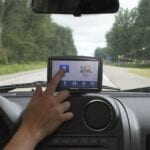Our children are the first generation in history to grow up in a world where the internet has always existed. Many of them know how to work an iPhone before they can talk. They may give you a quizzical look when you talk about things like VCRs, typewriters, and pagers.
In many ways, their generation will have incredible potential and the ability to create and excel at things that didn’t even exist when we were children. They will likely create technology that we can’t even fathom. The fully solar cars and houses of the future may come from their ingenuity.
They may never experience the sensation of being truly lost while driving somewhere with no GPS, cell phone, or other means of direction besides a physical map.
All of that is incredible, but the one downside to the “app generation” is that many of them are making it to adulthood without some basic life skills. These skills are ones they can’t outsource to an app or learn via Facebook.
9 Skills We Owe it To Our Kids to Teach Them
I often wonder what my grandfather’s generation would think of our current generation of children. How different they would look if we could compare a 19 year old boy then and a 19 year old boy now. My guess is that the boy from my grandparent’s generation would excel at practical skills and academics. The boy from our current generation would, of course, excel at technology.
I can say, with relative certainty, that young adults from past generations would likely possess more of these practical skills. With all the benefits of technology, we shouldn’t let these basic and important skills be lost to time:
1. Cooking
Statistically, we all cook less than we did a few decades ago, and we eat out more often. This is especially true of high-school and college age groups, who often don’t have the time, space or skills to cook.
My grandparents talked of a time when almost every meal was cooked at home. Meals out were rare, and most didn’t even depend on the school system to provide lunch. Statistically, people were also thinner and healthier at that time. Of course, there are many factors involved, but experts continually warn that eating out is linked to obesity and other health problems.
All of us have to eat, and most of us eat multiple times a day. Cooking is one of the most useful skills we can teach our children, and most of them really enjoy learning it! I spent a few months teaching my kids how to cook and now they are able and willing kitchen helpers who routinely make entire meals on their own!
I highly recommend this online video course for teaching kids of all ages to cook! “Mrs. Kimball” (a licensed teacher) teaches basic to advanced skills for kids of all ages. (If the course isn’t accepting new members, make sure to get on the waiting list- she will send some great cooking tips for kids while you are waiting for access to the course!)
2. Swimming
This skill isn’t as useful as cooking, but it can certainly be life-saving if it is ever needed. Recreational swimming or swim teams can be really fun and a great source of exercise for kids who enjoy the water. Even those who aren’t can benefit from basic swimming skills and the ability to get to safety in water.
Swim lessons are available in many places, and while this isn’t a skill everyone will use often, it is a life-saving one to have if it is ever needed!
3. Budgeting
I was recently flipping through channels and came across a movie about a girl who was a shopaholic. She was many thousands of dollars in debt and still shopping. Part of the reason she had gotten into so much trouble is that she didn’t really understand that credit cards are not just free money, but essentially a high-interest loan.
Many adults don’t even have a clear picture of their monthly finances and expenses. 38% of adults in the US report having credit card debt of some kind, with the average being over $5,000!
Teaching kids the basics of finances and teaching them to track and not outspend their income is one way to help them avoid these pitfalls as adults. Online programs like Mint make this process simple and kids can start learning to manage finances long before they live on their own. As a bonus, maybe some of our children will be the lawmakers of the future who finally balance the federal budget!
4. First Aid
As a parent, I’ve been grateful many times for the classes I took as a teenager in first aid and CPR. Babies really will put anything in their mouth, and while I thankfully have never needed to use CPR on one of my own, I’m glad to know it in case I ever do need to use it until medical help can arrive.
On top of that, kids are walking “boo-boo creators” and I find myself applying bandaids and butterfly bandages more often than I’d like.
Knowing a skill like CPR won’t benefit you directly (if you ever need it, you won’t be doing it on yourself), but it is a great skill to have and it may be life-saving for someone else some day! Many cities have free or low-cost first aid and CPR classes for kids and adults.
5. Self Defense
Thousands of children and young adults are the victim of abuse or assault each year. Those ages 12-34 are at the highest risk, though instances of abuse of young children are on the rise. It is sad to think that we live in a world where it is important to teach our kids how to defend themselves, but we do. Hopefully this is never a skill that your child has to use in a real-life situation, but there are many benefits to taking self-defense or martial arts classes, including:
- Learning self-control and self-discipline (incredibly important life skills)
- Gaining confidence
- Improving reflexes and balance
6. Basic Cleaning
Judging by the dorm rooms when I was in college, I’m guessing that most students never learned (or didn’t care about) basic cleaning skills. By adulthood, we should all have the ability to keep our living areas clean and livable. Teaching kids basic cleaning skills (and helping them learn consistency in cleaning) is also a great way to get them involved in keeping their living space (your house) clean now!
7. Critical Thinking
There may be many factors to blame, but experts seem to agree that we are seeing a broad decline in critical thinking ability. With the vast and unceasing amount of information we encounter on a daily basis, it seems that in many cases, it is easier to just choose to agree with or believe the information or to disagree or disbelieve it, rather than to think critically about. it. One of the most valuable (and difficult) skills we can teach our children in today’s world is to question information, even from “trusted” sources like textbooks, teachers, and the news. It will serve them well to teach them how to think, rather than just what to think.
8. Coding
We live in a technologically driven world that is changing rapidly and that offers many advantages. One major advantage is the ability to learn almost any skill online with enough time and motivation. Many specialized skills used to require a college education to learn, while many (not all, of course) can now be learned online. Top universities like Harvard, MIT, Yale, and Stanford have opened many of their classes up for students to watch for free online.
The hiring world is shifting too. While a college degree was once almost a guarantee of a job, many of the top companies today are hiring based on skill, not formal education level. This opens many new opportunities for anyone willing to take the initiative to learn.
Students can easily learn coding online, and in an increasingly technological world, these skills may continue to increase in value.
We use Codecademy for online instruction on how to code. It is easy to understand and interactive. Any student who is able to read can start learning many different coding languages on this site.
9. Car Care
Perhaps the least helpful of these practical skills as cars get more computerized and difficult to fix, but still beneficial nonetheless. I’ve saved so much money over the years by being able to fix minor car issues myself (or with the help of my dad). Even the ability to change a tire can save money and hassle when that skill is needed.
There probably many other basic skills I’ve left out that prior generations were proficient at and considered essential to know, but these are good start.
For full references, use source link below.




